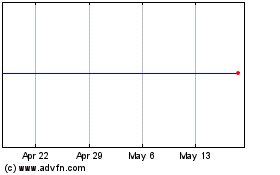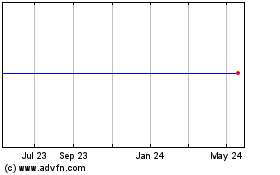Beverage Industry Continues To Invest Outside Traditional Products To Fuel Future Growth
December 02 2014 - 1:49PM
InvestorsHub NewsWire

- Big beverage appears to be watching the new calorie-burning
category very closely.
- Nestle's new product will most likely be only as good as the
science behind it.
- The beverage industry is asking, "Why stop at zero
calories?"
The giant
international food & beverage company has employed a team of
eight scientists to develop a beverage that, if successful, would
stimulate the raising of a body's metabolism in the same way that
moderate exercise does,Bloomberg News Service
reports. It is expected that the product will be in
development for at least two years.
It will be
interesting to see if Nestle's move, into this category, will be
followed by similar moves on the part of Coca-Cola (NYSE:KO), PepsiCo (NYSE:PEP) and Dr Pepper Snapple Group (NYSE:DPS).
There has been
growing concern in the C-suites of these companies over the slowing
sales of traditional soft drinks that contain high-fructose corn
syrup and other ingredients. Increasingly, these traditional
beverages, the foundation of many big beverage portfolios, are now
coming under scrutiny by consumers, and regulators, who are
concerned about the health effects of these products.
At the same time,
there has been tremendous growth in the non-traditional beverage
category, including such products as enhanced waters, specialty
teas, energy drinks, coconut waters, sports drinks and functional
products that target a variety of consumer interests including
relaxation, mental focus, digestive health, hangover recovery,
relief from stiff bones and joints, etc. The size and scope of the
functional beverage market has been estimated to be approximately
$60 billion, according to Euromonitor.
Subsequent
investigations into the product's assertions yielded the conclusion
that the Enviga product did not have substantial proof, on a
scientific basis, to validate its marketing claims of being a
calorie-burning beverage. An agreement between Coca-Cola and
Nestle, along with 27 State Attorney Generals, was eventually
reached to resolve the dispute over false advertising, promotion
and marketing. The two companies also agreed to pay a total of
$650,000 in fines to settle the matter.
It's nice to know
that despite their previous setback, Nestle (OTCPK:NSRGY) continues to work on the development
of a calorie-burning beverage. It seems to show their confidence
that the calorie-burning, or negative-calorie beverage category
does have a promising future.
The launch of
Celsius, the world's first and only calorie-burning beverage, came
in 2005, almost two years before the introduction of Coca-Cola and
Nestle's Enviga product. What set the Celsius product apart, and
ultimately differentiated the product from Enviga, was the fact
that prior to bringing the product to market, the company conducted
clinical studies to validate the efficacy of its calorie-burning
properties.
The importance of
these clinical studies cannot be emphasized enough. The scientific
evidence to support the advertising and marketing claims by Celsius
also helped the company to prevail in the
California Courts when a class-action lawsuit was brought
by a disgruntled consumer.
We believe that
it is exactly the kind of publicity that we saw last week in
Nestle's announcement that could act as a catalyst to finally
create awareness of Celsius Holdings, Inc. and their
products. Here is a company that
not only has been successful in a new beverage category, which they
pioneered, but they have accomplished something that two of the
most prominent beverage industry giants could not do effectively,
and yet nobody knows about them.
The ramifications
for investors appears to be that many of the most exciting, and
profitable, investment opportunities may come from smaller, lesser
known brands that are attracting the attention, not only of
consumers, but also of the big beverage companies.
Following these
new beverage trends, and the products behind them, requires keeping
a close watch on many of the smaller entrepreneurial type companies
that have not only developed exciting new products, but have
demonstrated success in their branding and marketing to
consumers.
It is within
these smaller companies where the impact of a newly-created and
successful brand will be most keenly felt. The contribution, of a
fast-growing brand, to a small company's top-line could be
meaningful, whereas it would barely be noticeable on the financial
statements of a beverage industry behemoth.
With revenues
through the first nine months of FY 2014 amounting to just over $10
million, we are of the opinion that the progress being made by
Celsius is being watched closely by beverage industry
executives.
The beverage
industry landscape is littered with small entrepreneurial companies
that have failed, but the likelihood of success increases
exponentially if a smaller brand can carve out a unique and
exciting new niche, where they can attract a consumer following,
and experience enough "sell-through" to carry the brand across the
chasm.
While it may
still be too early to ascertain the long-term appeal of
calorie-burning or negative-calorie beverages to consumers,
preliminary results compiled from Amazon's web
site regarding reviews of Celsius products show that many
of those consumers who try the products like them; for taste, for
increased energy and for better stamina during exercise and
workouts.
While Celsius has
yet to reach the mainstream consumer, Nestle's reemergence in the
calorie-burning space, makes it hard to argue that the marketing
executives over in Switzerland don't see the future value of this
beverage category. As the Bloomberg article points out "You can't
be 100 percent certain of the outcome. It's expensive. If anyone is
to explore it, it would be a company like Nestle."
We will continue
watching this space very closely for any additional insights,
updates or new developments. It will be interesting to see the
reaction to this news, if any, by the big beverage giants
Coca-Cola, PepsiCo and Dr. Pepper-Snapple Group. Other smaller
companies in the food & beverage space such as Bebida Beverage
Company (BBDA), High Performance Beverage Company (TBEV) and
Creative Edge Nutrition, Inc. (FITX) should also benefit from
the recent consumer trend in new age functional
beverages.
Disclaimer: The
opinions expressed herein are exclusively those of Altitrade
Partners. We do not provide investment advice, and do not offer buy
and sell recommendations on any securities mentioned in our
reports. For additional information, including our full disclaimer,
we invite you to visit the Altitrade Partners website
at www.altitradepartners.com
Fiat Chrysler Automobiles N.V (NYSE:FCAM)
Historical Stock Chart
From Dec 2024 to Jan 2025

Fiat Chrysler Automobiles N.V (NYSE:FCAM)
Historical Stock Chart
From Jan 2024 to Jan 2025
